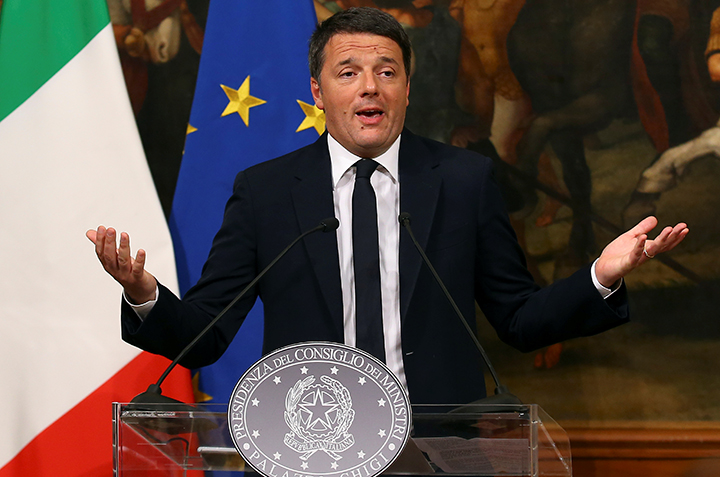 The victory of the “no” vote in the Italian referendum is not simply a rejection of reform, but will result in a significant loss of leadership on the European stage with the resignation of Prime Minister Matteo Renzi, according to Andrea Montanino, director of the Global Business and Economics Program at the Atlantic Council.
The victory of the “no” vote in the Italian referendum is not simply a rejection of reform, but will result in a significant loss of leadership on the European stage with the resignation of Prime Minister Matteo Renzi, according to Andrea Montanino, director of the Global Business and Economics Program at the Atlantic Council.
Montanino, a former career officer in the Italian Ministry of Finance, said that “the biggest problem in Europe now is the lack of leadership, the lack of someone to give a vision of what to do next.”
On December 4, Italians voted down a referendum designed to reform and streamline the processes of government. Renzi, who had said he would resign if the “yes” vote is defeated, handed in his resignation to Italian President Sergio Mattarella.
In Renzi’s absence, compounded by French President François Hollande’s decision to not to seek a second term in office and German Chancellor Angela Merkel’s decision to run for a fourth term, “the risk for the future of Europe, to me, is that you will have leaders… that are not able to find a common view,” Montanino said. Additionally, it will be hard for the United States to find a partner in an increasingly insular Europe, he added.
Montanino spoke in a press call on December 5 that was moderated by Fran Burwell, vice president of European Union and Special Initiatives at the Atlantic Council. They discussed the implications of the outcome of the referendum for not only Italy but Europe at large.
The referendum took place amidst growing concerns regarding the rise of populism throughout Europe, economic woes, and the persistent migrant crisis. While Burwell contended that Renzi had made his own decision to step down if the “yes” vote did not prevail, Montanino said that this decision came from his fundamental desire to push for reform. “It was a mistake to kick out Renzi because Renzi would have been the European leader able to change in a way the path of Europe…to fight with Merkel for a different Europe,” he said.
Montanino described how the referendum is not a unique instance, but rather a typical function of the Italian political process. “It’s a regular feature, but what happened this time is that Prime Minister Matteo Renzi attached so much important to the [survival] of his government… so people voted against him, instead of against the referendum,” he said.
Mattarella has asked Renzi to stay on to oversee the approval of the budget law. However, Renzi is definitely leaving, Montanino said, “it’s just a matter of avoiding the [leadership] vacuum.”
Burwell wondered whether the referendum could be likened to Brexit, the United Kingdom’s referendum decision in June to leave the European Union (EU). However, Montanino said that the outcome of the Italian referendum stands apart from other instances of populism seen recently. “In part, it’s rising populism, but it’s not like the Brexit vote… it was not a vote against the system for rising populism.”
“The dissatisfaction with the EU, it’s in a way an old story,” he said. “I think the Italian vote has something to do with this, not much, to be honest. I think it had more to do with internal politics.”
“The country is moving, maybe slowly, but it’s moving, and needs to go through deeper reforms,” according to Montanino.
With the rejection of the referendum, the Italian government will have to reassess the processes of reform. With regard to the banking sector, for example, Monte Dei Paschi Di Siena is a major bank in the process of recapitalization. Montanino described how the referendum can create delays in this process by deterring foreign investors who want to ensure there will be political stability before investing in a troubled bank. However, he said it is too early to determine the future of the banks.
Burwell said that the reaction of the Eurozone community to the Italian vote has been muted, rather than panicked. Thus far, she said, there has been no market turbulence.
However, the possibility of a bailout is a political reality in most European countries, Montanino said. “Banks are part of the economic system, so having the failure of a bank is always a problem. It could create bigger systemic consequences,” he added. Burwell said that a bailout would result in “more political and personal consequences.” However, according to Montanino, “if [a bailout] is needed, I think Europe should be ready to do so in a pragmatic way to avoid bigger risks.”
Rachel Ansley is an editorial assistant at the Atlantic Council.
Image: Italian Prime Minister Matteo Renzi tendered his resignation to Italian President Sergio Mattarella after voters on December 4 rejected a referendum designed to reform and streamline the processes of government. (Reuters/Alessandro Bianchi)
